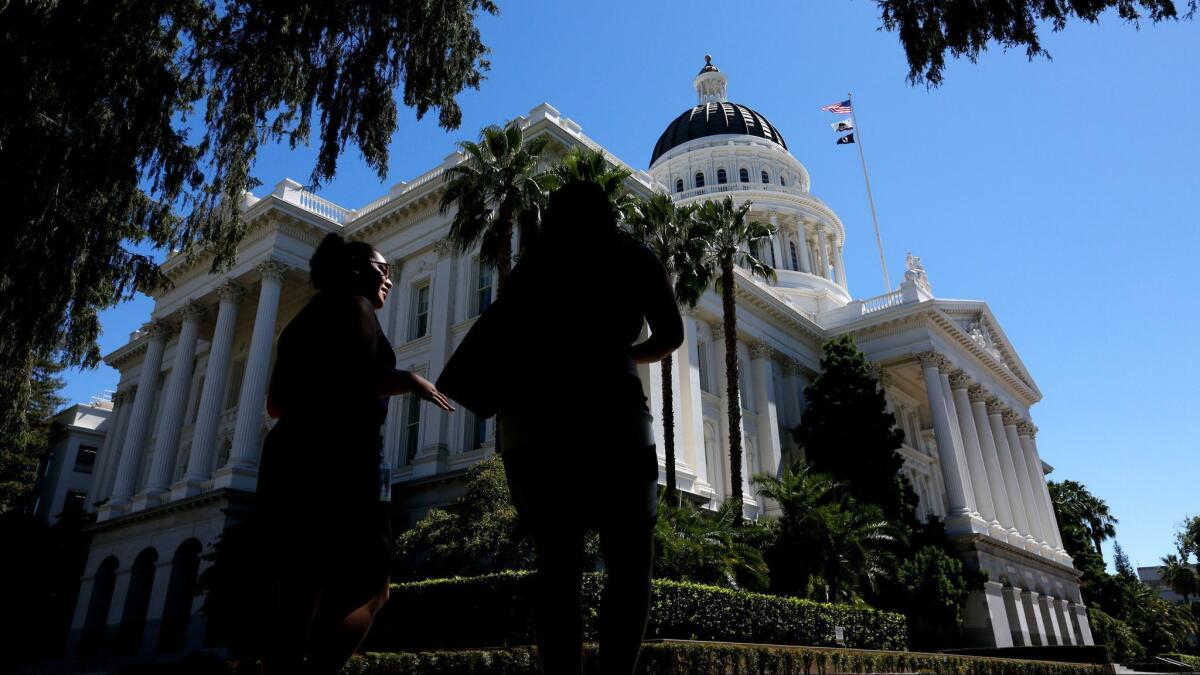California bill would ban boys’ and girls’ toy sections in big department stores

- Share via
A bill introduced in the California Legislature would require large department stores to stop divvying up toys and child-care items into boys’ and girls’ sections.
“In the state of California, where we hope to inspire, for example, more girls to get into science and engineering and mathematics, we want to ensure that those periodic tables and dinosaurs are not in the boys’ section,” said Assemblyman Evan Low (D-Campbell). “We just want to let kids be kids.”
Low, chairman of the Legislative LGBTQ Caucus, was a coauthor on the measure with Assemblywoman Cristina Garcia (D-Bell Gardens), leader of the Legislative Women’s Caucus. The bill, introduced Feb. 18, is in committee.
A former math teacher, Garcia said she wanted to play with Lincoln Logs as a child but was sometimes discouraged because they were seen as a toy for boys. But that kind of play can build spatial ability, which has been linked to improved performance in science, technology, engineering and mathematics — fields in which girls and women are often underrepresented.
“Playtime is fun, but it’s also about developing a skill set,” she said. “It’s about ideas and being creative. We want to make sure we’re not limiting a kid’s creativity.”
The bill would require department stores with 500 or more employees that sell child-care items or toys to maintain undivided sales floors for those items instead of segregating them by gender. The stores also wouldn’t be allowed to use signage denoting that a particular item is gender-specific.
Low said it was inspired by a staffer’s 9-year-old daughter, who complained to her mother that she had to go to the boys’ section to find toys that appealed to her love of science and math.
“At a young age, why would we want to prevent a young girl from getting into wood shop or being a firefighter?” Low said. “All of these items might be listed in the boys’ section.”
A first draft of the bill extended to children’s clothing and some retailers’ websites, but the language is being amended to remove those provisions, Low said.
He and Garcia said the bill would codify what many retailers are already doing, noting that Target phased out gender-based signage in its toy sections in 2015. That followed decisions by Walmart and Toys R Us to do the same.
“For California, we kind of feel like we’re playing catch-up,” Garcia said. “And we want to ensure that other folks are moving faster in that direction.”
Low compared the law to efforts to establish gender-neutral bathrooms, ban retailers from charging more for items marketed to women and require the presence of women on corporate boards.
“That’s the spirit of the law and what we hope to accomplish, especially in today’s day and age,” he said.
If it is voted out of committee and passed by the Legislature, the bill would take effect Jan. 1, 2024. Stores could be liable for a civil penalty of $1,000 if they fail to correct a violation of the provisions within 30 days of receiving written notice.
“This message is about inclusivity,” Garcia said. “I think we have kids who are figuring out their identities, and so we want to give them that safe space to do that.”
More to Read
Sign up for Essential California
The most important California stories and recommendations in your inbox every morning.
You may occasionally receive promotional content from the Los Angeles Times.











